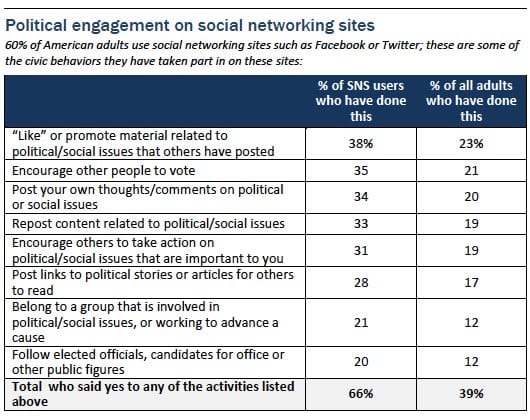10 Statistics You Didn't Know About Social Media and Politics


Technology has undoubtedly made our lives easier. The Internet provides us a constant flow of information, laptops allow us to take that information on the go, and smartphones enable us to share it with all the people we know, and even some we don't.
It has also played a critical role in the political sphere, with politicians increasingly signing on to Twitter and Facebook to connect with their constituents. Americans nationwide are responding in the form of tweets, likes, and hashtags, with civic engagement in the digital age on the rise.
To measure this phenomena, Pew Internet and American Life Project conducted a survey called Civic Engagement in the Digital Age. Here's what they discovered about social media and politics: Activities identified by Pew as civic and political engagement

1. Online Activity: During the 2012 election, 39% of all American adults took part in some sort of political activity on a social networking site. These users are referred to by Pew as "political social networking site (SNS) users."
2. Petitions Go Digital: 22% of Americans surveyed signed a paper petition in 2012 and 17% reported to have signed a petition online.
3. Election Stats: Obama's Twitter following in 2008: 118,000 followers. Obama's Twitter following in 2012: 20+ million. In 2012, he also engaged with his followers by hosting Twitter Town Hall meetings, utilizing trending hashtags, and made Twitter history with his post-election tweet.
4. Sharing is Caring: Of American adults who use social networking sites such as Facebook or Twitter, 28% have shared political news on their social networks for friends and family to read.
5. Social media as a platform: 60% of users who are politically active online have expressed a political or social belief via online channels — like emailing government officials or online petitions.
6. Social Sharing: 43% of SNS users decided to learn more about a political or social issue because of something they saw on social media.
7. New wave of political activism: 18% of respondents took action on a political or social issue because of something they read on a social networking site.
8. Offline Implications: Social media engagement leads to offline involvement, with 83% of political SNS users also getting involved in political or social issues offline.
9. Age matters: While younger adults are just as likely as older adults to be civically engaged, younger adults are much more likely to be politically active on social networking sites, Pew finds.
10. Political Contributions: While the bulk of contributions are made offline, the Internet is a growing space for political contributions, with around 23% of political donors making only online contributions in 2012.



